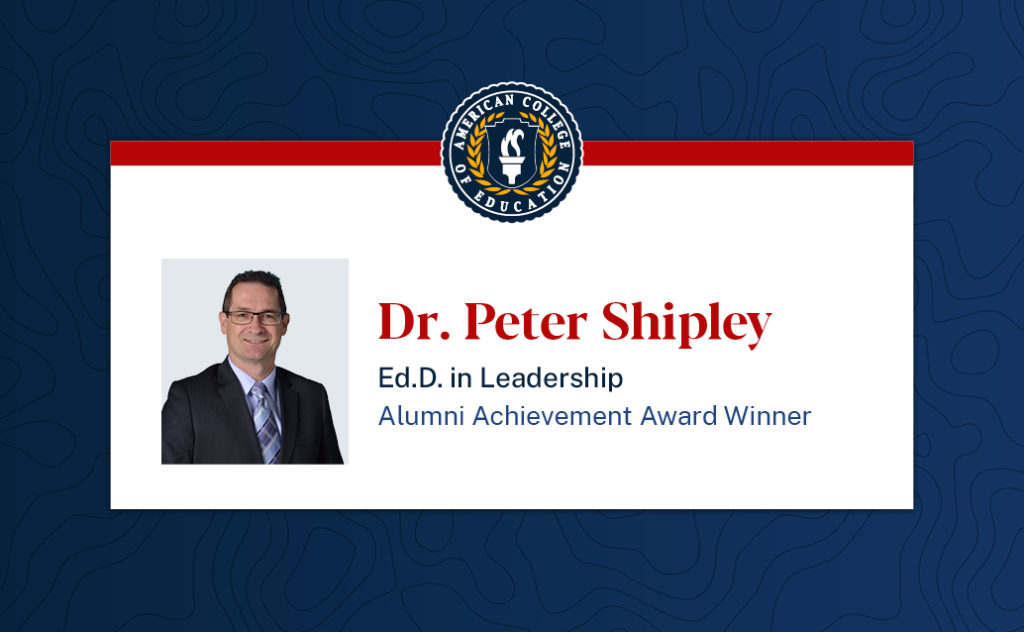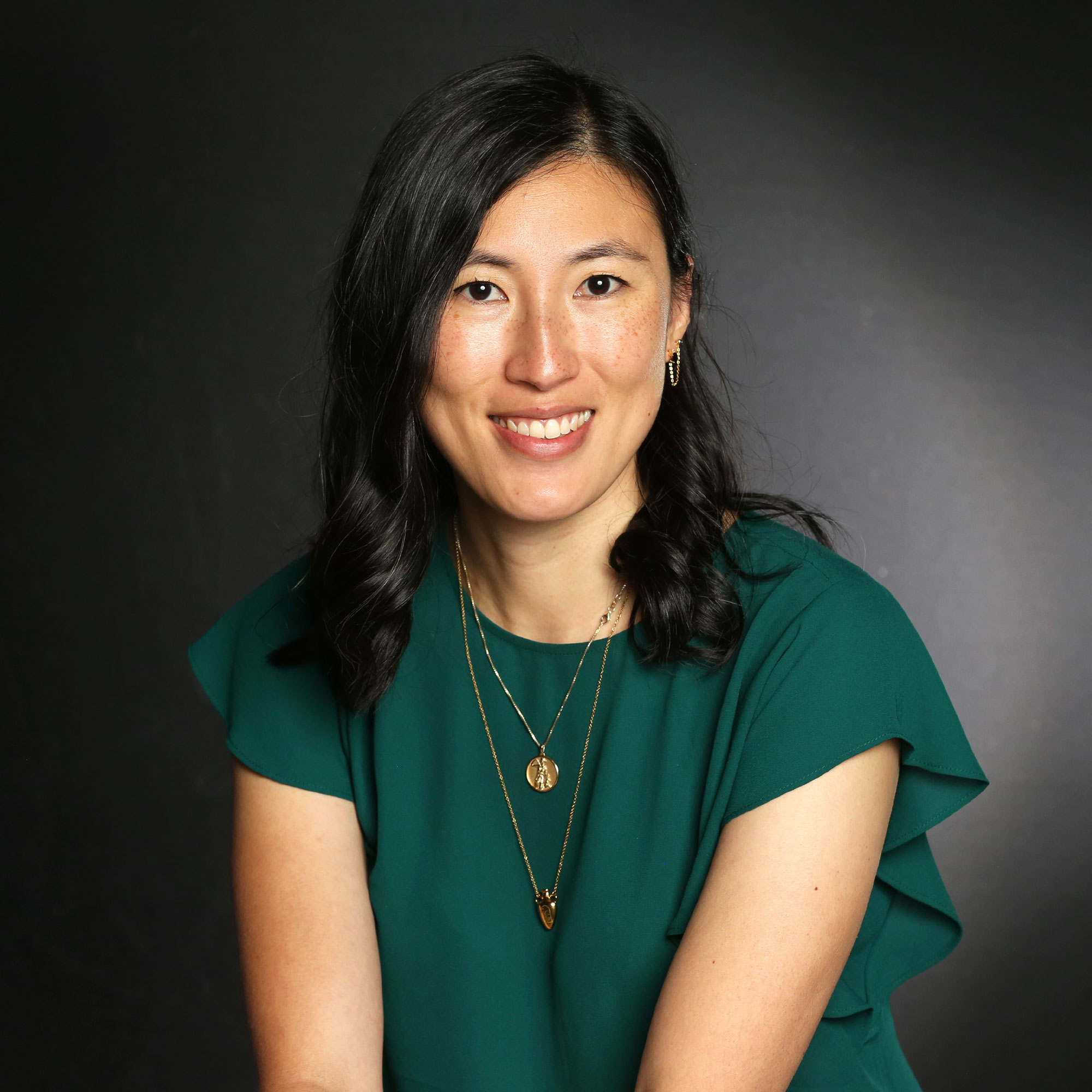
Meet Dr. Peter Shipley, recipient of the 2022 Alumni Achievement Award! Dr. Shipley graduated from ACE with an Ed.D. in Leadership in 2018 and has used the scholarship gained from his doctorate to make a profound impact on how police training and education should be designed, implemented and assessed. We spoke with Dr. Shipley to learn more about his impactful career.
ACE: Congratulations on receiving the 2022 Alumni Achievement Award! What does receiving this award mean to you?
Dr. Peter Shipley (PS): I am extremely honoured to have been selected for this award. As the first Canadian to be recognized for this award, it’s humbling. But the fact is you don’t achieve anything in life without a whole team to support you. You not only need outstanding faculty, but you also need your family to support you on a very long, personally driven goal. I have always wanted to make a difference, no matter how small, in policing, but also to provide an example for my children that learning doesn’t stop after high school, a degree or when you land your first job. One of my favorite quotes is from John Wooden: “It’s what you learn after you know it all that counts.”
I advocate for ACE’s doctoral program because it was a program that met all of my needs as a busy senior leader at the Ontario Provincial Police (OPP) Academy. The doctoral program can open up opportunities for you but, more importantly, improve your critical and analytical thinking skills as a leader.
ACE: What inspired you to pursue an Ed.D. in Leadership at ACE?
PS: I finished my master’s degree at Brock University in 2005 and was strongly encouraged to continue into a Ph.D. by my thesis/project advisor right away. I wasn’t ready at the time with a busy job, coaching and young kids involved in sports.
“ACE’s program was incredibly challenging, but the supports were in place to ensure you had every opportunity to be successful.”
The cost of higher education is a major barrier for most folks who are not privileged with rich parents or just cannot take on extreme levels of debt. It took me about a year to search and decide on the right Ph.D. or Ed.D. program for me. I reviewed the details of a number of universities, but I wanted one that was cost effective, accredited, robust with a challenging and flexible curriculum, organized through an effective learning management system and more. ACE’s program was incredibly challenging, but the supports were in place to ensure you had every opportunity to be successful.
ACE: You’ve had a long and successful career in the Ontario Provincial Police, working and making a tremendous impact in how police officers are trained. In your experience, what is most important when it comes to designing effective training experiences for police officers?
PS: There are a number of important factors that need to be considered when designing effective training experiences for police officers.
It is important to devise a training process which connects with the psycho-motor, cognitive and affective domains. Each one of those domains impacts an officer’s decision-making ability. This is what the public is demanding – that our officers make the right decisions, quickly. It’s much more challenging than the public realizes. Some police agencies are introducing training equipment or newly canned programs without assessing their value, need or placement within the curriculum. Blended scaffolding of training which focuses on a cognitive apprenticeship approach is needed.
All of this is to point out that the most important factor when it comes to designing effective training experiences is to have qualified professional educators who understand policing design the training. We need to have police leaders who understand evidence-based approaches when programs are reviewed, modified and approved. The doctoral program at ACE definitely prepares you to understand the complex issues which impact the decisions you need to make as a leader at an educational institution or organization.
“ACE’s doctoral degree has enabled me to ask more probing questions and identify potential issues with any kind of leadership decision.”
ACE: How did your doctoral degree enhance or move your career forward?
PS: Since I began the pursuit of my doctoral program late in my career, I was not under the illusion that it could assist me in advancing my career in policing as a civilian leader. What it did do for me was add credibility to the OPP Academy. ACE’s doctoral degree has enabled me to ask more probing questions and identify potential issues with any kind of leadership decision.
As a result, I was asked to lead a number of projects/initiatives – street/check training (anti-racial profiling) and cannabis legislation training, just to name a few. I also led the creation of a unit which responded to police training inquires from all sides, internal leadership to members of the public to civilian oversight agencies. This facilitated more transparency around how police officers are trained.
The doctoral degree enabled me to implement and embrace a more evidence-based approach to data and training. As President of the Canadian Association of Police Educators, I was able to work with a great team to deliver our very successful 2019 conference with a similar theme: “Pracademics: Bringing the Gap between Academia and Police Training.”
ACE: You’ve led several police and police educator organizations. You’ve also lent your expertise to others, even internationally. Which of these experiences was most memorable to you and why?
PS: I have been blessed with so many opportunities to learn and grow, so each organization I have led has been memorable. It really is difficult to choose one. However, if I had to pick one, it would be my involvement with the State and Provincial Police Academy Directors section of the International Association of Chiefs of Police. This group included academy directors from all fifty states and provinces which had provincial training institutions. I had the honour to serve this group of dedicated leaders in a number of roles, including five years in the General Chair role.
There was such an incredible synergy. We all respected each other and wanted to improve training and education across our state or province. We supported each other, but we also challenged each other with our ideas to ensure we were accountable, especially if there were outdated thinking or approaches.
“As I have told the thousands of officers I have trained or led, the only reason you are here is to serve the public, all the public.”
We recognized the need to go outside policing into higher education and conducted instructor exchange programs internationally. In one case, our organization was hosting instructors from Michigan State Police and they witnessed how we were conducting interview training for our recruits. Their deputy director called his director immediately and said they had to implement this process/program. Agencies have continued to share ideas and best practices to continually improve and modernize their training.
ACE: Is there anything else you’d like to share?
PS: Police legitimacy and public trust of the police are creating barriers between some communities and police departments. In order to enhance public trust, police must be selected and trained through an equitable, inclusive, bias-free, research and evidenced-based process. The ACE doctoral program can provide the professional and accredited approach toward ensuring the analysis, design, development, implementation and evaluative components of your training are research-based. We have a long way to go in certain areas, but this is an important first step.
One of the things I am most encouraged by is the extensive number of collaborative partnerships I have seen over the past several years between police, community groups and universities/colleges. As I have told the thousands of officers I have trained or led, theonly reason you are here is to serve the public, all the public. Continue to lead by demonstrating professionalism and a commitment to fair, equitable, inclusive and bias-free application of the law for everyone. Hold those accountable who do not.
Education is the means by which we can all get there and ACE will continue to be a driver of change in many professions, even outside of the formal higher education route.
American College of Education’s online doctoral programs will help you gain the expertise you need to drive significant change and study in your field.

